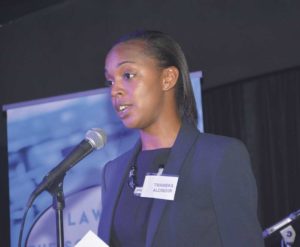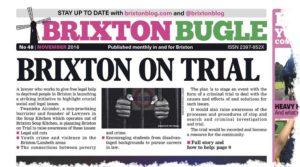Lawyers in the Soup Kitchen recently made the first ever film to be allowed in the Royal Courts of Justice. The organisation Twanieka Alcindor launched three years ago in Coldharbour Lane has come a long way

Twanieka Alcindor began Lawyers in the Soup Kitchen in 2014. She had no idea then whether anyone would come to the Brixton Soup Kitchen on Coldharbour Lane to get advice from her. But she did know that her community was – and is – in great need of legal advice.
She need not have worried. On the second night there was a queue waiting. Today, a team of 16 volunteers, including law students and practitioners, is available to help every week on Thursday evenings.
 Twanieka (right) attended a local school and was the first in her family to go to university. Now a non-practising barrister, she encourages those from socially disadvantaged backgrounds to get into law and women already in pursuit of a legal career to progress.
Twanieka (right) attended a local school and was the first in her family to go to university. Now a non-practising barrister, she encourages those from socially disadvantaged backgrounds to get into law and women already in pursuit of a legal career to progress.
Lawyers in the Soup Kitchen (LISK) operates a free weekly advice clinic that educates the local community in simple legal matters and provides legal assistance to those who cannot afford legal representation in areas like crime, family, employment, civil disputes, housing, benefits, and immigration.
Twanieka’s team of law students and practising lawyers provide access to justice for the most vulnerable members of society and dedicate their time to equipping people who do not have formal legal qualifications or experience with the skills to represent themselves in legal proceedings and negotiations.
“We give advice and guidance on the spot if we can,” she says. “In nine out of 10 cases that’s enough.” A typical case is that of a woman about to be evicted. “You’re my last hope,” she told Twanieka, who says: “I was able, in two hours, to contact the housing authority and request a stay on the eviction until it got sorted. They refused and we went to court and won a stay of eviction.”
Her motto is “Turn nobody away.” She is passionate that people should know their rights and what to do if a bailiff turns up at the door. When LISK are unable to act on someone’s behalf, they can refer them to local solicitors who will take the cases pro bono – lawyers’ Latin meaning “for good”. The solicitors work for nothing for the public good.
Cuts to legal aid since 2012 have hit hard and mean that it is increasingly difficult for ordinary people to get the legal advice that they need. “We help communities help themselves and use our legal studies to help the disadvantaged,” says Twanieka.
In her day job as a crown court case worker, she sees 16-to-17-year-old boys involved in knife, firearm and acid attacks. The need to reach such people was one of the reasons why, in 2017, Lawyers in the Soup Kitchen raised £2,500 to host a simulated case – Brixton on Trial – at the Royal Courts of Justice, in partnership with the National Justice Museum.

The project was designed to educate and inspire young people from the local community and schools about their rights under police stop and search, and the process and procedure of a criminal trial. We can show that the system is not so intimidating and less them versus us.
“Those who attend the Soup Kitchen are adults. We didn’t want to miss the opportunity to reach younger people and start educating youth about how the court system works.
“In the mock trial we showed the roles judge, jury and lawyers play; what the police role is and how evidence is gathered.” On the day of the simulated trial, around 50 local people boarded a bus to the Royal Courts of Justice in London’s Strand. Using a recent murder case relevant to the local area, Twanieka’s project created an opportunity for some of those most at risk of joining gangs or taking part in criminal activities to gain an insight into the criminal justice system and to interact with positive role models from the legal profession.
A film of the trial will premier locally in the new year. It was made in a single take and was the first time a film crew had been allowed in the Royal Courts of Justice. LISK has just celebrated its third birthday. You can contact them at advice@lisklaw.com. If you would like to help, you can donate at gofundme.com/2rxu3m4.






